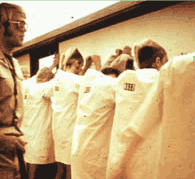The evolution and spread of ideas

Watch this video. It is 15 minutes long and presents some really interesting ideas about ideas, culture, and conflict.
TED | Talks | Dan Dennett: Ants, terrorism, and the awesome power of memes (video)
Here’s one of those talks that can change your view of the world forever. Starting with the deceptively simple story of an ant, Dan Dennett unleashes a dazzling sequence of ideas, making a powerful case for the existence of “memes” — a term coined by Richard Dawkins for mental concepts that are literally alive and capable of spreading from brain to brain. On the way, look out for:
+ a powerful one-sentence secret of happiness
+ a compelling insight into terrorists’ motivation
+ a chilling view of Islam
And just when you think you know where the talk’s heading, it dramatically shifts direction and questions some of western culture’s fundamental assumptions. This. Is. Unmissable.
Technorati Tags: ideas, memes, evolution, culture, conflict, terrorism, TED conference
The evolution and spread of ideas Read More »


 This is an interesting article on things that people can do better than computers, like judge beauty, and how that can be exploited to build better computer services.
This is an interesting article on things that people can do better than computers, like judge beauty, and how that can be exploited to build better computer services. Here is an interesting article on how child rearing has changed. We are severely limiting the freedom of our children because of perceptions, but not realities, of risks. There are serious concerns about the psychological effects. Are we raising children to be risk-averse, crippled by fears, and phobic?
Here is an interesting article on how child rearing has changed. We are severely limiting the freedom of our children because of perceptions, but not realities, of risks. There are serious concerns about the psychological effects. Are we raising children to be risk-averse, crippled by fears, and phobic? Wayne Gretzky-Style ‘Field Sense’ May Be Teachable
Wayne Gretzky-Style ‘Field Sense’ May Be Teachable Here is an article on the validity of Internet polling. Many researchers do surveys on the Internet because it is cheap and convenient. This article points out the problems in making sure the research sample is representative of the population being studies.
Here is an article on the validity of Internet polling. Many researchers do surveys on the Internet because it is cheap and convenient. This article points out the problems in making sure the research sample is representative of the population being studies. Here is another article on the biological basis of moral behavior. Once again, new brain imaging techniques are allowing us to study these higher cognitive processes, and raising interesting philosophical questions.
Here is another article on the biological basis of moral behavior. Once again, new brain imaging techniques are allowing us to study these higher cognitive processes, and raising interesting philosophical questions.
 The Congressional Research Service (CRS) in the United States recently issued a
The Congressional Research Service (CRS) in the United States recently issued a 